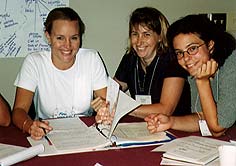|
Archived Content from Conference Held in October 2008
Search Results
Symposium: Developing Pre-school Curriculum for Dakota and Ojibwe Language Immersion Programming
Friday, October 17, 10:00 am, Room: Governors IV
Betty Jane Schaaf, Wicoie Nandagikendan Urban Immersion Project
Beth Brown, Wicoie Nandagikendan Urban Immersion Project
Brendan Fairbanks, Wicoie Nandagikendan Urban Immersion Project
Barbara Hanska, Wicoie Nandagikendan Urban Immersion Project
Lillian Rice, Wicoie Nandagikendan Urban Immersion Project
This presentation will combine PowerPoint and group discussion to present Wicoie Nandagikendan's Indigenous Immersion Strategy developed by the Wicoie Nandagikendan Dakota & Ojibwe Urban Immersion Project. This will include learning from three years of experience, program design, elders' experience, mentor/apprentice practices, and curriculum development.
|
Paper Session: ETandem Learning: Boosting Intercultural Competency in Real Time
Friday, October 17, 10:00 am, Room: Great River Ballroom I
Colleen Coffey, Marquette University
Janet Banhidi, Marquette University
Intercultural linguistic immersion is now taking place virtually from our classrooms, computer labs and even personal computers. During this session we will prove that eTandem learning is highly effective in achieving intercultural competency by sharing best practices and data gathered from a University Virtual Global Language and Cultural Exchange project.
|
Paper Session: Immersion Teachers’ Lived Experience of Balancing Content and Language
Friday, October 17, 10:00 am, Room: State I
Laurent Cammarata, University of Georgia
Diane Tedick, University of Minnesota
In this presentation we report on a phenomenological study that tapped the experiences of three veteran immersion teachers in the U.S. once enrolled in a year-long professional development program designed to prepare them to effectively balance content and language instruction. Implications for professional development and future research are also highlighted.
|
Discussion Session: Inclusion in French Immersion: Views from Both Sides of the Desk
Friday, October 17, 10:00 am, Room: State III
Callie Mady, Nipissing University
Katy Arnett, St. Mary's College of Maryland
This session will explore conflicts between policy, beliefs, and best practices within inclusion in French immersion. Though informed by empirical research, most of the discussion will be shaped by a French as Second Language teacher’s personal experiences with her youngest son in French immersion and the diagnosis of his learning disability.
|
Paper Session: Increase Comprehension through Integrating Arts into Content Areas
Friday, October 17, 10:00 am, Room: Great River Ballroom IV
Iran Amin, Montgomery County Public Schools
Angie Loomis, Montgomery County Public Schools
The presenters will demonstrate how to use arts integration techniques to deepen students' understanding of the curriculum and increase retention of vocabulary and concepts in any content area. Participants will brainstorm ways to apply these techniques to their own discipines.
|
Paper Session: Ivrit B'Ivrit: Hebrew Language Use in Preschool Immersion Program
Friday, October 17, 10:00 am, Room: Kellogg II
Yonah Atari, York University
This study explores patterns of language use in Senior Kindergarten classrooms in a Hebrew immersion program in a Jewish school in Canada. Findings show that students’ receptive language skills are more developed, oral language use is prominent during teacher-directed activity and religious practices. Hebrew literacy is imperative in Jewish identity development.
|
Discussion Session: ¡Sí se puede! Effectively Addressing Social Justice in the Classroom
Friday, October 17, 10:00 am, Room: Kellogg III
Dair Obenshain, Dual Language Education of New Mexico
… or, “when we unionized the third grade but the fourth graders abandoned the UFW to work at McDonald’s.” We will share successes and disasters from addressing social justice issues in the classroom, knowing there is no ‘one size fits all.’ Bring experiences, songs, lessons and questions to share!
|
Paper Session: Swimming Upstream: Advocating for Immersion Programs in New Settings
Friday, October 17, 10:00 am, Room: Windows on the River
Linda Evans, University of South Florida
Sylvia Amaya, Pinellas County Schools
Mildred Garcia, High Point Elementary
Jan Kucerik, Pinellas County Schools
Jaisree McCormick, High Point Elementary
Ashleigh Smith, Ridgecrest Elementary
Yadira Vega, High Point Elementary
Colleen Wapole, Ridgecrest Elementary
Two elementary schools in a district in Florida took two different pathways to immersion education: a) a two-way Spanish/English immersion program, and b) a Spanish immersion program for gifted students. Teachers, coordinators and university personnel share issues of program development, teacher and student identity, and continued advocacy in each setting.
|
Paper Session: The Cajun Alphabet and Authentic Louisiana Documents
Friday, October 17, 10:00 am, Room: Kellogg I
Peggy Feehan, St. Martin Parish Schools
Louisiana French Immersion teachers are constantly creating classroom materials that reflect our particularity as well as our students’ reality. This session has two parts. First, it will provide you with our own Cajun Alphabet (materials included). Secondly, social studies activities that use authentic documents will be presented.
|
Paper Session: The Intersection of Identity and Language Choices in Immersion Education
Friday, October 17, 10:00 am, Room: Governors III
Denise Minor, California State University Chico
This study examines the intersection between teacher identities, student identities and the effectiveness of motivational systems in prompting L2 interaction among students in an immersion school. Results from the investigation reveal that the key factor impacting language choices of the case study participants was their identity within the classroom community.
|
Paper Session: The Role of Oral Language in Early French Immersion
Friday, October 17, 10:00 am, Room: Governors II
Martine Pellerin, University of Calgary
This paper examines the ethnographic study carried out by the presenter to gain a greater understanding of the role of (L2) oral language as a cognitive tool to support the development of early literacy in learners with diversified socio-linguistic backgrounds in Early French Immersion programs in Alberta, Canada.
|
Symposium: Three Perspectives on the University of Ottawa New Immersion Program
Friday, October 17, 10:00 am, Room: Great River Ballroom II & III
Alysse Weinberg, University of Ottawa
Sandra Burger, University of Ottawa
The University of Ottawa’s French Immersion program involves disciplinary and adjunct language courses, support services and certification testing. In this symposium, studies presented include 1) a mixed-method, multi-informant program evaluation 2) a survey-based evaluation of adjunct courses 3) a focus group study tapping students’ experiences in adjunct courses at two proficiency levels.
|

|




